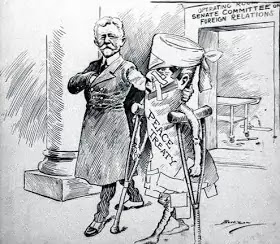Also Read
The first world war had inspired a good deal of English poetry, much of which attained to high levels of art while others were mediocre. Many of the young poets of the time actually want to front and exchange the sword for the pan. They wrote from their actual experience of the incalculable horror and massacre of the war. Two attitude are revealed in these war poems of the "Soldier Poems". First one is the romantic or sentimental view of war, which looked upon it as the splendid opportunity for displaying exalted Patriotism and glowing self-sufficient in the cause of freedom, and the the revival of the chivalric ideal. The second one set out to tear and veil of romance that invested war and exposed its horrors with stern realism and deadly irony.
Rupert Brooke and Julian Grenfell belong to the first group. Both died in 1815 and to careers were cut off. Rupert Brooke was a poet of genius and his poem written before the war show marks of true greatness. In his five war sonnets of which The Soldier is the best he writes of the war in a strain of exalted idealism and patriotic fervour. Young soldiers in his view rush into the battlefield and mouth of cannon in order to sacrifice them self on the altar of patriotism. To them death is not death but martyrdom and there is nothing to lament over it. Though experienced the horrors of War 'Grenfell' maintained his moral courage and mood off tranquility in the midst of hurley burly and turmoil of war. He could mentally withdraw himself from the smoke and dust of war and find solace in the objects of nature. Death to him was a rest to which he would go as confidently as man go each night to bed. This is the note struck in his famous poem into battle.
Siegfried Season and Wilfred Owen belong to the opposite group. In the unfinished preface to his contemplated volume of war poetry, Owen wrote "I am not concerned with poetry, my subject is war and the pity of war the poetry is in the pity". War to him is not splendour but an ugly and darti business. He did not indulge in sentimental glossing of the horrors but give realistic pictures. His Spring Offensive, Strange Meeting, Anthem of the Doomed Youth, Insensibility, are most memorable war poems in their antisentimental note and highly poetical qualities.
Sassoon too presented the war without any gloss or mincing of matters. In counter attack he speaks of the brutalities of war with an amazing frankness. He was disillusioned in the hope of awaiting public conscience for stopping the war. Some regarded him as a clank his poems unlike those of Owen, Seldom reach the higher level of poetry but his is sincerity and conviction moved all.
Intrawar Period
Rupert Brooke and Julian Grenfell belong to the first group. Both died in 1815 and to careers were cut off. Rupert Brooke was a poet of genius and his poem written before the war show marks of true greatness. In his five war sonnets of which The Soldier is the best he writes of the war in a strain of exalted idealism and patriotic fervour. Young soldiers in his view rush into the battlefield and mouth of cannon in order to sacrifice them self on the altar of patriotism. To them death is not death but martyrdom and there is nothing to lament over it. Though experienced the horrors of War 'Grenfell' maintained his moral courage and mood off tranquility in the midst of hurley burly and turmoil of war. He could mentally withdraw himself from the smoke and dust of war and find solace in the objects of nature. Death to him was a rest to which he would go as confidently as man go each night to bed. This is the note struck in his famous poem into battle.
Siegfried Season and Wilfred Owen belong to the opposite group. In the unfinished preface to his contemplated volume of war poetry, Owen wrote "I am not concerned with poetry, my subject is war and the pity of war the poetry is in the pity". War to him is not splendour but an ugly and darti business. He did not indulge in sentimental glossing of the horrors but give realistic pictures. His Spring Offensive, Strange Meeting, Anthem of the Doomed Youth, Insensibility, are most memorable war poems in their antisentimental note and highly poetical qualities.
Sassoon too presented the war without any gloss or mincing of matters. In counter attack he speaks of the brutalities of war with an amazing frankness. He was disillusioned in the hope of awaiting public conscience for stopping the war. Some regarded him as a clank his poems unlike those of Owen, Seldom reach the higher level of poetry but his is sincerity and conviction moved all.
